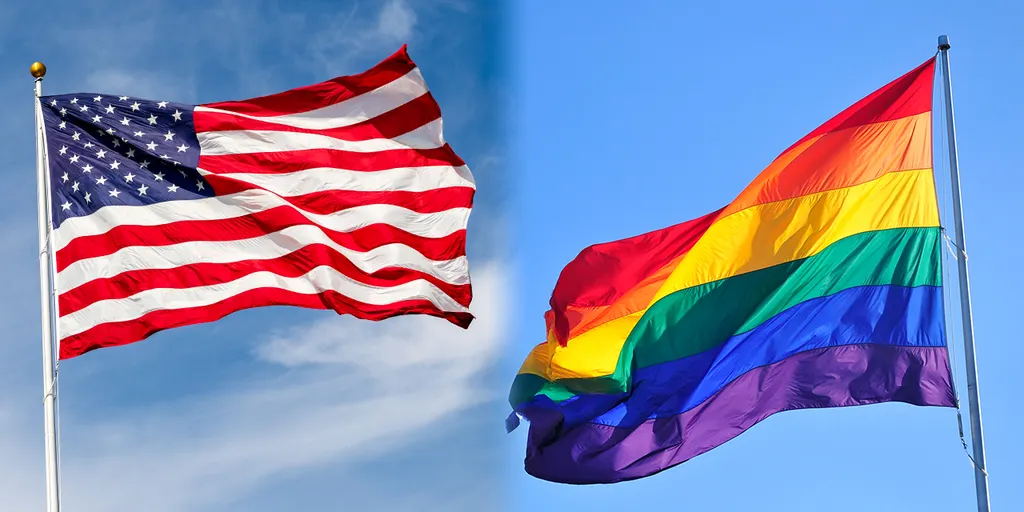Kristin Pitzen, a teacher from the Newport Mesa School District in Orange County, recently ignited a nationwide debate when she removed the American flag from her classroom, instead suggesting that students pledge allegiance to the Pride flag. Her decision, shared in a now-deleted TikTok video, quickly sparked widespread backlash, highlighting sensitive issues around patriotism, inclusivity, and the role of educators in the classroom. In this article, we’ll delve into the details of the incident, the community’s response, and the broader implications for education.
Teacher’s TikTok Sparks Controversy Over Flag Removal

Kristin Pitzen posted a video on TikTok explaining that she had removed the American flag because it made her “uncomfortable” and mentioned that she had “packed it away.” She lightheartedly recounted a student’s question about what they should look at during the Pledge of Allegiance, to which she suggested they look at the Pride flag instead. While Pitzen’s video was intended as a humorous update, it quickly went viral, sparking intense reactions from parents, veterans, and others who felt her actions disrespected American values and traditions.
Many critics argue that the classroom is a place for unity and that the American flag represents the country’s foundational ideals. Pitzen’s decision to substitute the American flag with the Pride flag left some parents questioning whether this crossed a line, viewing it as an endorsement of one particular cause at the expense of national unity.
The Pledge of Allegiance: A Symbol of Patriotism in Schools
For generations, the Pledge of Allegiance has been a fixture in American classrooms, symbolizing loyalty to the country and respect for freedom. Reciting the pledge is seen as a tribute to those who have sacrificed to uphold the nation’s values. Pitzen’s choice to remove the flag raised concerns among many who felt that it disrespected this time-honored tradition.
Many parents and community members voiced their concerns about what they perceived as a dismissal of the American flag’s importance. One mother stated, “We heard the school was short some flags, so we decided to help out,” and promptly joined others in planting American flags across the school grounds, illustrating their belief in the flag’s significance in classrooms across the country.
Support for Inclusivity: Encouraging LGBTQ Pride in the Classroom

Pitzen, a vocal supporter of the LGBTQ+ community, has adorned her classroom with Pride-themed decor to create a welcoming environment for students. In another now-deleted TikTok video, she expressed her support, saying, “I love you all very much—for the people who are out, who aren’t out. You’re appreciated. You’re loved. You’re enough.” Her messages resonate with many who advocate for inclusivity in schools.
However, some argue that encouraging students to pledge allegiance to the Pride flag may convey favoritism toward a specific ideology, potentially alienating students with differing beliefs. While inclusivity is valued, critics of Pitzen’s actions suggest that encouraging a pledge to any symbol other than the American flag could make some students and families feel unwelcome in a public classroom setting.
Backlash and School District Response
The community’s response to the viral video was swift. Many parents, veterans, and community members were outraged, viewing the decision as disrespectful to a national symbol. Michele Vaughn, a mother whose son serves in the military, voiced her disapproval, saying, “I’d like to share with [Pitzen] the importance of respecting the flag.”
The Newport Mesa School District responded to the controversy by releasing a statement affirming their commitment to American values and emphasizing that they were “investigating the situation.” Subsequently, Pitzen was removed from her role as the district continued its review. For many in the community, this incident underscored the importance of maintaining a balance between fostering inclusivity and respecting national symbols in the classroom.
The American Flag as a National Symbol
For countless Americans, the flag represents unity, freedom, and the sacrifices of those who have served the country. Pitzen’s removal of the flag led many to believe she was undermining these principles. For those critical of her actions, the American flag symbolizes the values and freedoms that have shaped the country.
One concerned community member noted, “The flag represents the freedom she enjoys today. It stands for the people who gave her the freedoms and opportunities she has now.” Another echoed these sentiments, explaining that the flag’s presence in schools reminds students of the principles of freedom and democracy.
Balancing Free Speech, Inclusivity, and the Role of Educators

This incident highlights the complex dynamics of free speech, inclusivity, and the responsibilities of educators. Teachers are charged with creating safe, welcoming spaces for all students, yet they also serve as representatives of the community’s values. The challenge, critics say, is balancing the promotion of diversity without compromising respect for national symbols.
In today’s diverse classrooms, inclusivity is a fundamental priority. Yet, some argue that respect for national symbols, like the American flag, should coexist with inclusive values. For teachers, navigating these waters is no simple task; each decision carries significant impact, affecting students, families, and the broader community.
Repercussions and Implications for Education
As a result of her actions, Kristin Pitzen no longer teaches at the Newport Mesa School District. The debate surrounding her decision continues to stir discussions on social media, where people are divided over whether her actions supported inclusivity or crossed a line. Some defend her as an advocate for LGBTQ+ rights, while others see her actions as a departure from classroom norms and disrespectful to national traditions.
For educators, this incident underscores the importance of balancing personal beliefs with professional responsibilities. It also serves as a reminder that while promoting inclusivity, teachers are entrusted with respecting the diverse perspectives within their communities.
Conclusion: Balancing Inclusivity and Patriotism in Schools
Kristin Pitzen’s decision to remove the American flag from her classroom spotlights a deeper tension between fostering inclusivity and respecting national values. The American flag is a powerful symbol of unity, freedom, and sacrifice, and its removal in the classroom evokes strong reactions from those who hold these ideals close. While inclusivity is crucial in today’s world, Pitzen’s actions highlight the delicate balance teachers must maintain between personal expression and professional responsibility.
As classrooms grow increasingly diverse, navigating this balance becomes essential for educators. By fostering an environment that respects both national symbols and individual identities, teachers can build inclusive spaces that honor both diversity and unity.


